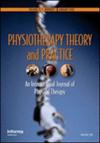Kinesiophobia mediates the influences on attendance at exercise-based cardiac rehabilitation in patients with coronary artery disease
IF 1.6
4区 医学
Q2 REHABILITATION
引用次数: 35
Abstract
ABSTRACT Purpose: To identify predictors of attendance at exercise-based cardiac rehabilitation (CR) and to test the hypothesis that kinesiophobia mediates the influence on attendance at CR in patients with coronary artery disease (CAD). Patients: In total, 332 patients (75 women; mean age 65 ± 9.1 years) with a diagnosis of CAD were recruited at Sahlgrenska University Hospital, Sweden.Methods: The patients were tested in terms of objective measurements, self-rated psychological measurements, and level of physical activity. A path model with direct and indirect effects via kinesiophobia was used to predict participation in CR. An exploratory selection of significant predictors was made. Results: A current incidence of coronary bypass grafting (p < 0.001) and a diagnosis of ST-elevation myocardial infarction (p = 0.004) increased the probability of attendance at CR, while kinesiophobia (p = 0.001) reduced attendance. As a mediator, kinesiophobia was influenced by four predictors and the following indirect effects were found. General health and muscle endurance increased the probability of attendance at CR, while self-rated anxiety and current incidence of heart failure had the opposite effect. Conclusions: This study suggests that kinesiophobia has an influence on and a mediating role in attendance at CR. The results need to be further investigated in relation to clinical practice.运动恐惧症介导冠心病患者参加以运动为基础的心脏康复的影响
目的:确定运动心脏康复(CR)出勤率的预测因素,并验证运动恐惧症介导冠状动脉疾病(CAD)患者参加CR的假设。患者:共332例患者(女性75例;在瑞典Sahlgrenska大学医院招募了平均年龄65±9.1岁,诊断为CAD的患者。方法:采用客观测量、自评心理测量和体力活动水平对患者进行测试。通过运动恐惧症直接和间接影响的路径模型来预测CR的参与。探索性地选择了显著的预测因子。结果:目前冠状动脉搭桥术的发生率(p < 0.001)和st段抬高型心肌梗死的诊断(p = 0.004)增加了CR的出席率,而运动恐惧症(p = 0.001)降低了出席率。运动恐惧症作为一个中介,受四个预测因子的影响,并发现以下间接效应。一般健康状况和肌肉耐力增加了参加CR的可能性,而自评焦虑和当前心力衰竭的发生率则有相反的效果。结论:本研究提示运动恐惧症对CR出勤率有影响和中介作用,结果有待于进一步的临床实践研究。
本文章由计算机程序翻译,如有差异,请以英文原文为准。
求助全文
约1分钟内获得全文
求助全文
来源期刊

Physiotherapy Theory and Practice
REHABILITATION-
CiteScore
3.40
自引率
10.00%
发文量
300
期刊介绍:
The aim of Physiotherapy Theory and Practice is to provide an international, peer-reviewed forum for the publication, dissemination, and discussion of recent developments and current research in physiotherapy/physical therapy. The journal accepts original quantitative and qualitative research reports, theoretical papers, systematic literature reviews, clinical case reports, and technical clinical notes. Physiotherapy Theory and Practice; promotes post-basic education through reports, reviews, and updates on all aspects of physiotherapy and specialties relating to clinical physiotherapy.
 求助内容:
求助内容: 应助结果提醒方式:
应助结果提醒方式:


